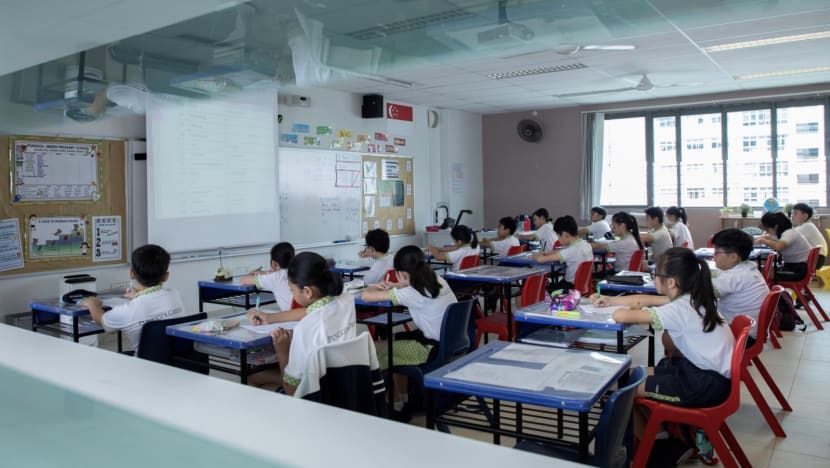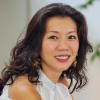Commentary: Singapore students should be taught world affairs to avoid binary thinking
Some parents are concerned about what Singapore schools are teaching students about the Israel-Hamas conflict. But what’s of more interest is how educators encourage effective discussion, says mother-of-three Cherie Tseng.

Primary school students in a classroom. (File photo: Facebook/Chan Chun Sing)

This audio is generated by an AI tool.
SINGAPORE: The first time the concept of war became real to me was in the early 90s, when I, as a Primary Five student, learnt that Iraq invaded the smaller, oil-rich country of Kuwait. I am foggy on the details, but I recall my then form teacher bringing in the television on wheels to show us things pertaining to the war.
Later that day my father took me to a minimart my aunty ran to stock up on rations. My takeaway was that what happened on the other side of the world could affect me here in Singapore.
Years later, when I became a parent, I thought it was brave of my teacher to tell us about the war. Is 11 too young to be told these things? Might it scare the little ones? What if parents feel the school overstepped its boundaries?
The past few weeks, these thoughts have resurfaced alongside concerns voiced by parents after learning that schools were teaching students about the Israel-Hamas conflict, as part of the Character and Citizenship Education (CCE) syllabus. The lessons are tailored accordingly for upper primary and secondary school students.
Some parents raised concerns that students were being presented with a narrative that was not neutral and lacked historical context of the wider conflict in the region that dates back centuries.
In response, Minister for Education Chan Chun Sing said that the lessons were aimed at helping students understand their own emotions and empathise with others; reflect on safeguarding cohesion in a multiracial society; learn how to verify information sources; and appreciate diverse views.
He added in parliament on Monday (Mar 4) that the lesson content had been misrepresented on social media, leading to some teachers receiving abusive comments online. Nonetheless, the lessons on the Gaza war will be further customised for different age groups, and teachers will be given more support in conducting them.
The nature of the Israel-Hamas conflict makes crafting any educational package about it challenging. But not addressing it in the classroom could be seen as insufficient, or worse, interpreted as choosing one side.
CRITICAL THINKING IN AN AGE OF SOCIAL MEDIA
While it's undeniable that parents play a significant role in shaping their children's thoughts, schools also have a crucial responsibility: To impart the skill of critical thinking in an age of social media.
In May 2023, New Jersey became the first state in the United States to require that students learn media literacy skills. Students at all pre-university levels will learn how information is produced and spread on the internet, the difference between facts and opinions, and the ethics of creating and sharing information online.
More broadly, students need to develop what educators call “global competence”. They must be open to a variety of viewpoints, have the ability to communicate across cultural lines and be inclined to contribute to a greater good.
The zeitgeist of today's interconnected world demands that schools equip students with a global perspective, ensuring that education on world issues is not just an elective but a cornerstone of their learning experience.
When we consider generative AI and the sheer speed of news spread these days, it becomes even more urgent and imperative that school instruction like that of New Jersey’s becomes part of the mainstay.
MORE THAN TWO SIDES
One of my favourite book series is a trilogy by Amie Kaufman called Elementals. It delves into an age-old conflict between two clans of shape-shifting humans: The ice wolves and the scorch dragons.
The story follows a pair of fraternal twins from the Ice Wolf Clan who discover they have the prized and rare ability to shapeshift; except one of them unexpectedly morphs into a scorch dragon.
In book two, readers are given history lessons in dragon territory and their instructor’s ethos for inquiry remains one I find myself going back to often.
“There are at least two sides to every story, and usually a lot more than that,” says the Dragon Historian. “So you should look for the sides you don’t know and then ask yourself why you didn’t hear them.”
Traditional problem-solving approaches tend to rely on either-or thinking. Dr Douglas O'Loughlin, an expert in organisational development, discussed in his 2018 essay, “Fostering civil and open dialogue in Singapore”, the inclination to create narratives where we position ourselves as the “good guys”.
He calls this the “Disney effect”, and it stems from our early, learned ability to categorise characters as “good” or “bad”. However, he cautions against the oversimplification of casting those with differing views as the “bad guys”.
SOCIAL MEDIA PRESSURES
Speaking with my own children and students in my social circle, there is a palpable sense of apprehension with regards to contentious subjects. A friend’s 14-year-old daughter told me that in a recent survey she did for a project on social media pressures on youth, some of her classmates said they felt the need to post on issues in a certain way for fear of being cancelled.
In an op-ed titled I Don’t Have To Post About My Outrage. Neither Do You, American journalist Elizabeth Spiers observes how people on her X timeline – herself included - are pressured into taking a stand on the Israel-Hamas war.
“But a reactionary social media post tells you nothing about what (one) really thinks or knows, cheapens the discourse and impedes progress,” she warns.
Feeding the need to take a position, like a simple pros-and-cons essay we write, deters us from realising that being silent and attentive has its value and place in today’s loud and cacophonous world. It allows crucial and needful voices to rise above the noise.
I recognise the necessity for schools to disseminate the lesson package addressing the Israel-Hamas conflict, and appreciate their efforts to enlighten students on such a complex issue.
My interest, however, leans more towards the pedagogical strategies schools employ to encourage more effective conversations rather than the specifics of the lesson material. It is easy to take a position on a single action, but to do the same in haste on an issue, especially one with all its twisting complexities, is dangerous.
Taking time to sit quietly with a topic should be acceptable, and feeling goalposts shift with new learnings, insights and perspectives is entirely healthy and normal.
In an age where reaction often precedes reflection, teaching our students how to think is not just an educational priority. It is also a parenting urgency that lays the cornerstone of a future where wisdom, not impulsivity, moves us forward.
Cherie Tseng is Chief Operations Officer at a local fintech company, a mother of three and editor with The Birthday Collective.




















